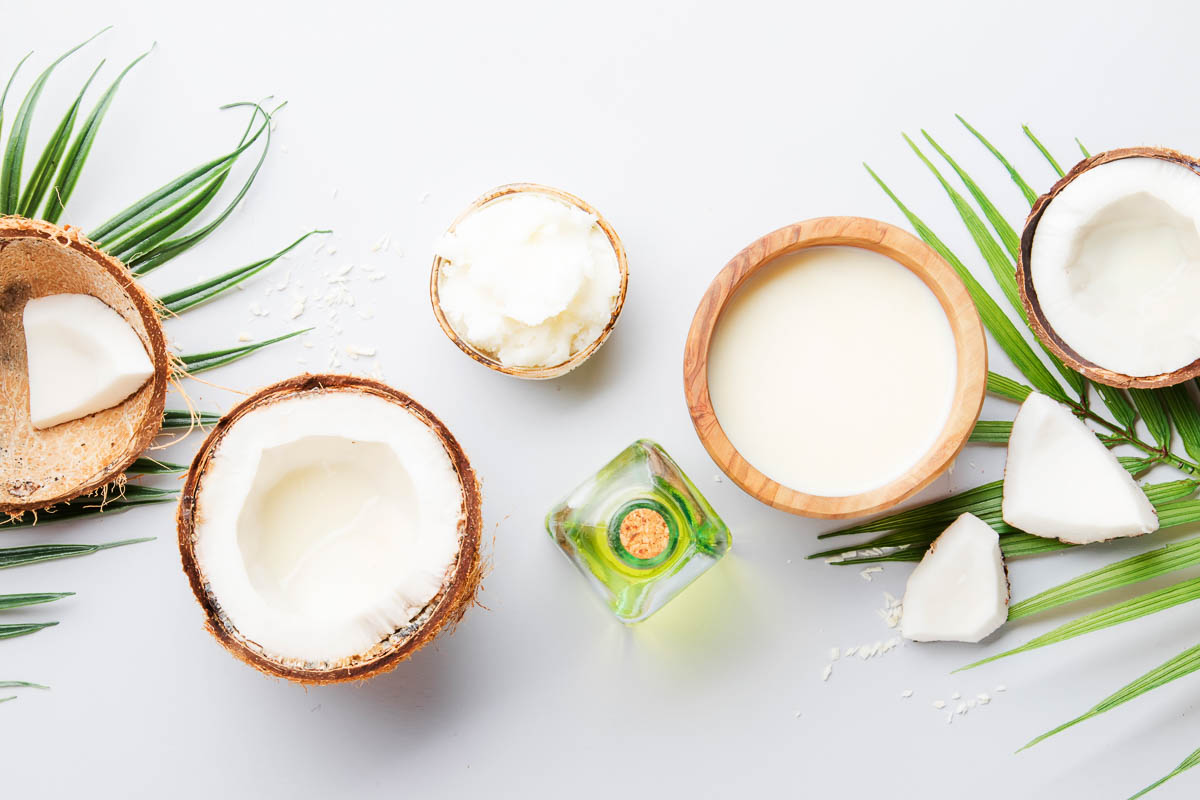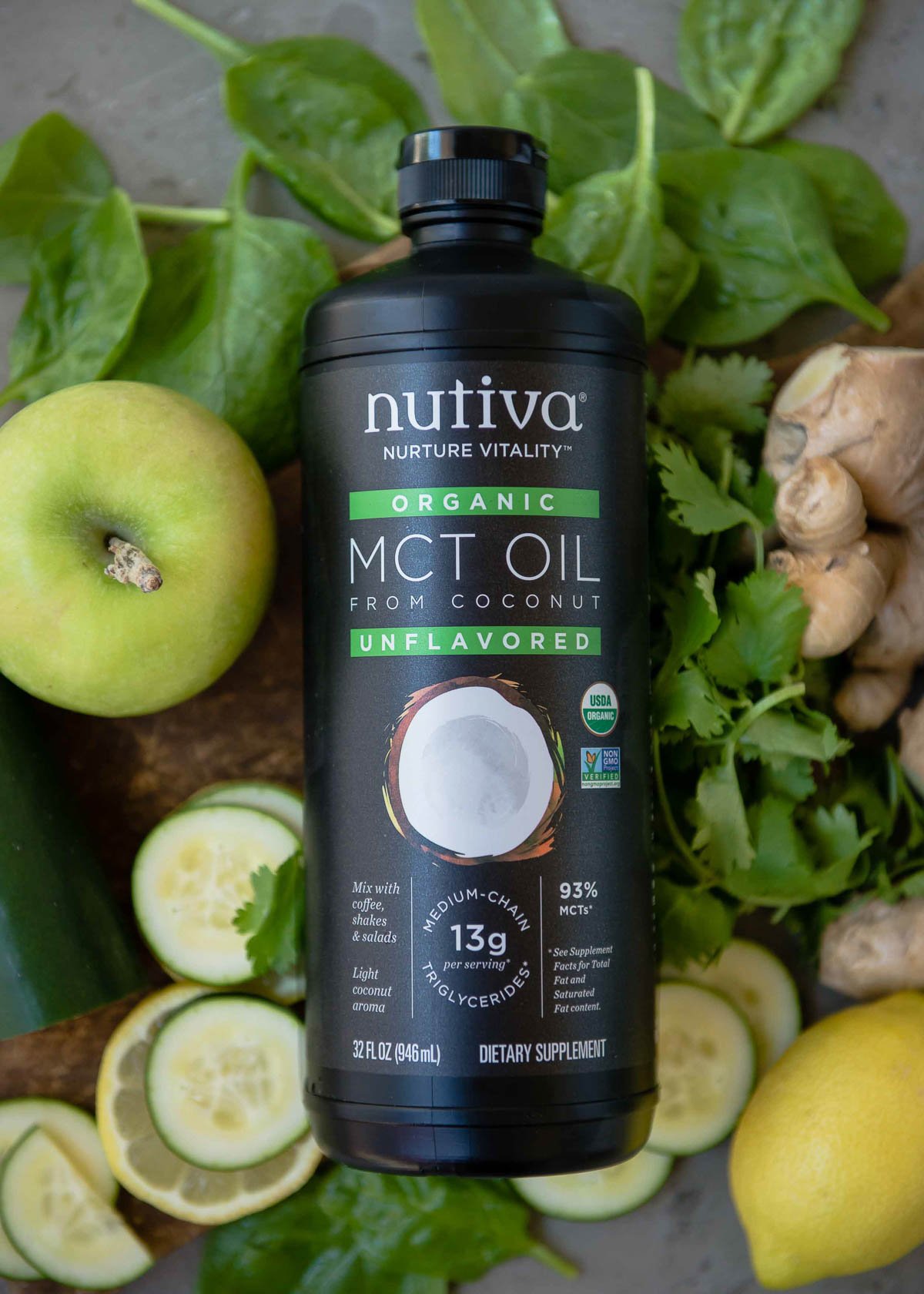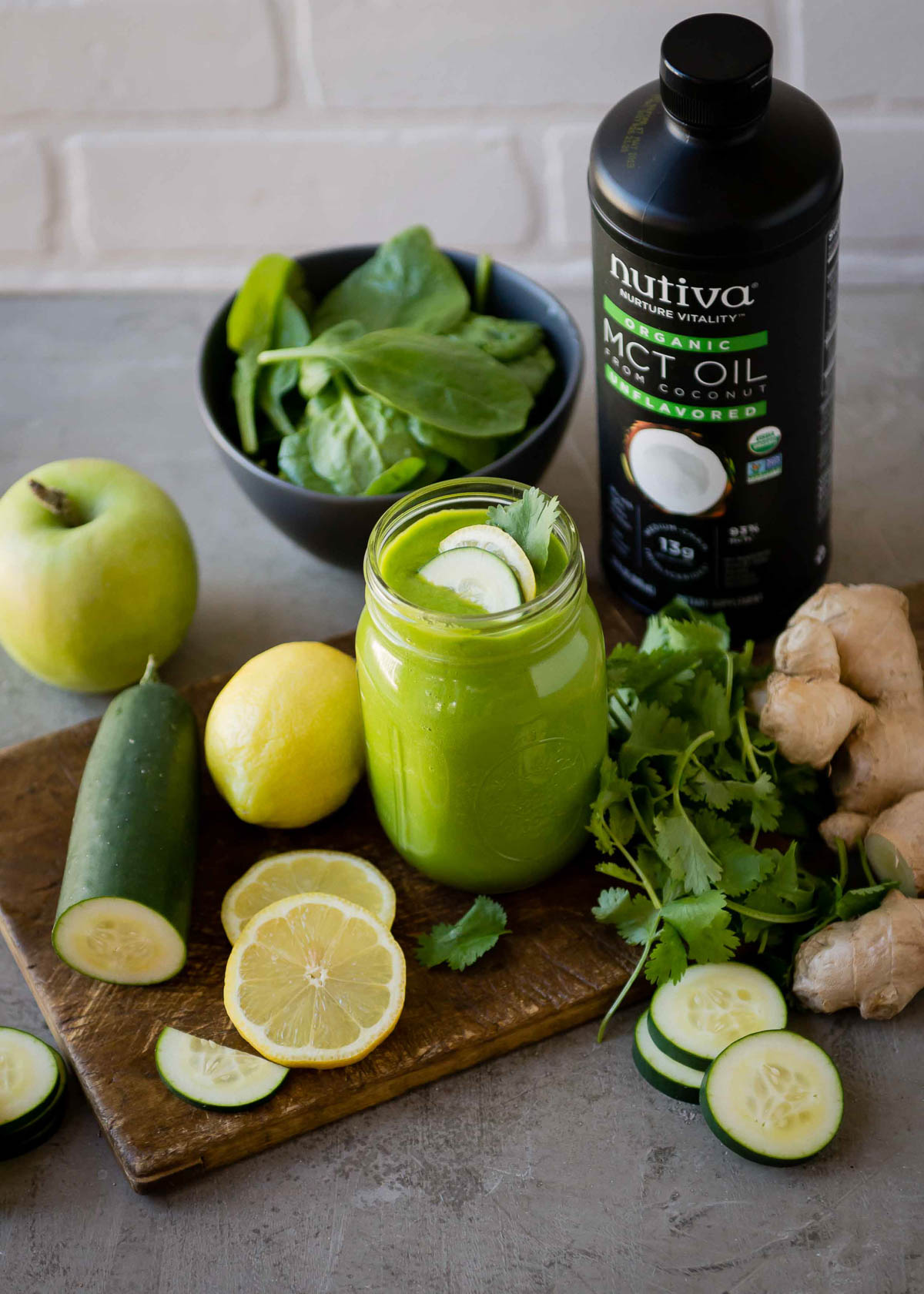This post may contain affiliate links. Please read my affiliate policy.
Medium-chain triglyceride or MCT oil is emerging as a popular alternative to traditional coconut oil in the world of healthy fats. Which one is better, is one better and why? Let’s talk about MCT oil vs. coconut oil, coconut oil and MCT oil benefits and all the ways you can use both in your food, home and life.
I use MCT oil in my morning healthy coffee routine and coconut oil in everything from homemade toothpaste to healthy zucchini bread!
Table of Contents

What is MCT Oil?
From kitchen experiments to wellness routines, the rivalry between MCT oil and coconut oil fuels our curiosity about their respective roles in daily health and vitality. I’m going to compare and contrast these two plant-based healthy fats to help you understand when to use each to maximize the benefits.
MCT oil is a concentrated source of coconut oil with only medium-chain triglycerides, or saturated fats. It is derived from coconut or palm oil.
To separate the “MCTs” from the other fats naturally found in coconut oil, it goes through a process called fractionation, or heating up the oil and then cooling it to the point where the long chain triglycerides (LCTs) or the lauric acid, return to a solid form and the MCTs or the caprylic acid and capric acid are still liquid and can be separated.
The process of fractionation is aided by chemicals, so when I buy this oil I look for one that has been expeller pressed. This process doesn’t use chemicals and instead slowly squeezes out the oils from the coconut then takes that fat and chills it down slowly to separate the MCTs from the LCTs.
My favorite brand of both organic coconut oil and organic MCT oil is Nutiva.

MCT Oil vs Coconut Oil
Honestly, both oils are a good source of healthy fat, yet they do have their differences. Coconut oil contains over 50% MCTs, while MCT oil is close to 100% MCTs, making them usable in different ways and beneficial in different ways as well.
Below is a breakdown sharing more features of the two awesome oils.
COCONUT OIL
- Higher heat point: can be used in baking and cooking
- More affordable per ounce
- Has a slight coconut-taste
- Solid at room temp
- Used in larger doses
MCT OIL
- Low heat point: best in coffee, smoothies and salad dressings.
- Higher amounts of MCTs
- Flavorless
- Liquid all the time
- Used in small doses
Both oils are often promoted as aids to weight loss, however, MCT oil is shown to greatly reduce cravings and overall food intake throughout the day.
Coconut oil contains both medium chain and long chain. MCTs don’t require bile acids or pancreatic enzymes to be digested and instead transfer right to the liver to be used. If you struggle with an intestinal disease, talk to your dietician about using MCT oil to help. Because of this rapid digestion, MCT oil is less likely to be stored as fat and can promote weight loss more than other fatty acids.
Both of these options have healthy benefits in their own way, so the “winner” of the MCT oil vs. coconut oil debate depends on what you want from them. I know Western culture has been leery of fat for decades but that is not the case anymore. Join me in embracing healthy fat and using it the way our body needs it.
MCT Oil Health Benefits
- Promotes digestion: Since it starts digestion in the liver, MCT oil doesn’t take the time that other oils do to break down. This gives it the unique ability to process more quickly and take other foods with it down the digestive tract. WARNING! Adding too much MCT oil can lead to a lot of bathroom time. Start small with one teaspoon and slowly increase intake when first consuming.
- Is tasteless: Unlike coconut oil, MCT oil doesn’t have that lingering coconut taste. We know not everyone likes coconut, so if this is you, give MCT oil a shot! It is a super healthy fat, with virtually no taste or smell.
- Encourages weight loss: This oil works to promote feelings of fullness in our bodies, as well as keep us feeling full throughout the day.
- Helps create a healthy gut: MCT oil encourages healthy bacteria and supports gut lining.
Coconut Oil Health Benefits
- Antibacterial: The lauric acid in coconut can fight infections like staph and yeast in adults.
- Aid in digestion: Our bodies need healthy fats, and use this oil to absorb nutrients, making them easily digested.
- Anti-fungal and Antiviral: The fatty acid makeup of this oil also leads it to be anti-fungal and antiviral, so it is a great natural ingredient to add to deodorants, toothpaste and other hygienic products.
- High in lauric acid: Only breastmilk has a higher lauric acid concentration than coconut oil. This powerful acid actually helps increase immunity and fight infections, which makes it essential to our daily diets.
- Lower blood sugar: This can be used to help diabetics lower blood sugar according to a study on virgin coconut oil.

How to Use MCT Oil
MCT oil is very concentrated, meaning you don’t need much of it to get the benefits. The suggested serving size of MCT oil is 1-2 teaspoons. so use it in non-cooking recipes. Check out some of my favorite uses for MCT oil below:
- Healthy coffee
- Add one teaspoon to a Healthy breakfast bowl
- Add one teaspoon to your smoothie recipe
- Coconut milk smoothie cubes
- MCT oil smoothie
- Add one teaspoon to your salad dressing or sauces
Another great type of MCT oil is MCT powder, which binds the oil to acacia fiber turning it into a healthy fat and fiber source that can easily be blended into smoothies.
How to Use Coconut Oil
Coconut oil specifically has such a wide range of uses, food and otherwise, making it a great addition to our quest for a more natural lifestyle. In the MCT oil vs. coconut oil debate, coconut oil definitely wins out as the more versatile of the two. Some of my favorite food and non-food uses include:
It has a high smoke point and can therefore be used in all kinds of cooking, baking and sautéing. Go wild!
Common Questions
They are both excellent choices when adding healthy fats to your diet, yet they do different things and should be used in different ways. MCT oil is great in coffee and smoothies to aid in digestion and kickstart your metabolism. It helps you feel full longer since MCTs have faster absorption in the body. Coconut oil has a high heat point making it great for all kinds of high-heat cooking and baking. It has a variety of non-food uses like in a variety of beauty applications for a variety of skin conditions and functional home purposes.
Depending on the application, you can swap MCT oil with coconut oil. Where you use one teaspoon of MCT oil, you can use one tablespoon of coconut oil. Just be careful if you want to swap coconut oil with MCT oil. You don’t want to use the latter in cooking/baking, instead swap in another kind of vegetable oil like avocado oil or olive oil.
MCT oil has several health applications from treating candida to lowering blood sugar and raising HDL cholesterol. Note that it can also raise LDL cholesterol, so always consult your medical professional before adding it to your diet.
Which type do you like to use? Why? Drop a comment below and let me know!











“You don’t want to use the LADDER”, I think you mean “LATTER”, but a well-written piece nonetheless.
Thank you for calling that out Mike. I just updated the article and appreciate you taking that time to give me a heads up!
Dan,I like the way you explain everything also I would like to know what is a good collagen to use and I don’t drink coffee so can I put it in tea .
We recommend This Grass-fed Collagen or you can find a plant-based collagen alternative. Any beverage works for adding collagen — coffee, tea, and smoothies are great options!
I am allergic to coconut oil. What else can I use?
That’s a great question Patty, and it will partially depend on what you are using it for. If you’re using it for some of the health properties you can use avocado oil, hemp oil or fish oil. If using it for cooking you can try avocado oil or extra virgin olive oil.
No one seems to discuss the actual liquid coconut oil. Regular coconut oil is solid at room temperature because of the C12 (lauric acid) content. But liquid coconut oil has most of the C12 removed so the remaining C6, C8 and C10 remain and are in a liquid state. Granted there is still C6 and C10 which most MCT oil has reduced but seems like it would still be a possibly cheaper source of MCT oil overall. After all, there are benefits to the C6 and C10, aren’t there?
I’m sure there are, Tony. It seems regular coconut oil and MCT oil are easier to come by which I believe is why we discuss those as opposed to liquid coconut oil. 🙂
I am ready to try MCT oil. Thank you for explaining things.
Glad we could help!
This is truly a question I ask all the time— is mct oil worth it? It’s always so expensive! Now i know how to use it and what the results will be. Thanks for finally making it black and white for me.
So glad you found this post helpful! 🙂
i do take mct. every so offen , just a teaspoon, it upsets my stomach but true it does curve my appetite
Thanks for this informative video! . I do use your coconut smoothie ice cubes.
Recently I followed the KETO diet. I enjoyed their Bulletproof coffee-same as the MCT Oil/butter coffee you show each morning. I had terrific results. List 20 pounds and felt full from the morning coffee. However, after about 3 months My cholesterol nearly tripled!! I stopped the coffee, and threw out all the high fat meats and dairy and began following a more basic low carb diet. I began to add back in some fruits and veggies that I had been missing. I still have about 10 more pounds to lose. I’ll have my cholesterol rechecked in about 6 weeks. I loved what that MCToil and butter coffee did for me each day. Will I ever be able to go back to starting my day with it???!?
Linda, we suggest speaking with your health care practitioner and/or nutritionist regarding something this specific. They know you + your body best. 🙂
This is great info! And after watching that video, I now need this coffee in my life. Can’t wait to try the powder too… I am not the biggest fan of the taste of coconut, and this solves that!
Awesome! So glad we can help you find something that’s going to work for you!
When adding coconut oil to smoothies do you have to melt it first or just drop in solid?
Renee, you could do it either way. I think if you have a high-powered blender you could just drop it in solid but if don’t, you may want to melt it to a liquid first.
Very helpful and informative.
I’ll try both of them ..
It’s was new information for me..
Thank you.!
Glad this helped you, Maria!
I am so glad I watched your video all the way to the end. I love how you broke down all the ways you use coconut oil, mct oil, and liquid coconut oil… that one always confused me! Quick question: is there an alternative to using grass fed butter in the coffee? I am trying to go dairy free and was curious if you have a suggestion.
Hey Dani!You can definitely swap out the grass fed butter for another high fat creamy option like coconut cream or full fat coconut milk from the can. Both of these would still create a creamy, smoothie result and keep the fat content high, which is part of the goal with this coffee. At first, I was scared to eat so much fat… but I honestly feel really good when doing this and no longer get the coffee jitters and do feel like I work with more focus. Hope you try it!
Dani, I’d suggest using MCT oil in place of grass-fed butter. Many folks who are trying to avoid dairy use it and love it in their coffee!